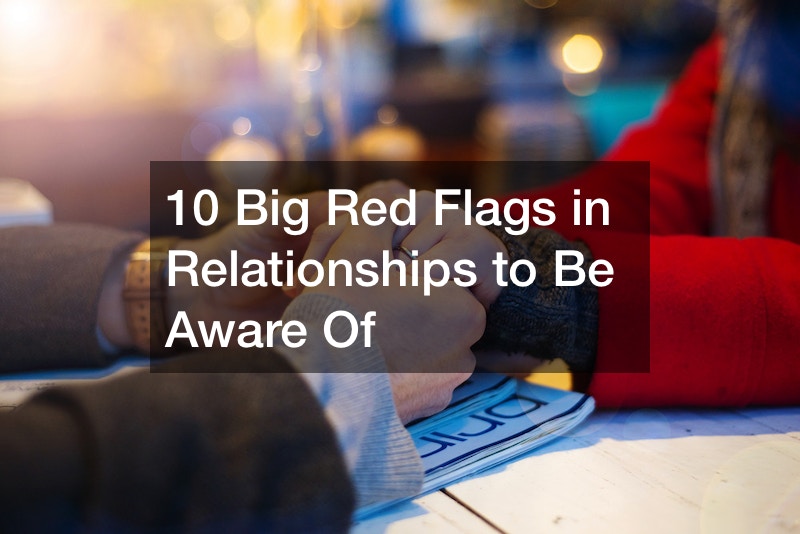
If you’ve ever questioned whether something in your relationship is a ‘big red flag,’ you’re in the right place. It’s crucial to recognize these warning signs early on before things spiral out of control. This guide’s got you covered, highlighting 10 major red flags you shouldn’t ignore. It’s designed to help you distinguish between minor relationship hiccups and serious issues that could spell trouble. Let’s jump right into it and start protecting our hearts, shall we?
Not Respecting Your Time

One significant red flag in any relationship is a clear disregard for your time. We’ve all been there — waiting for your partner while they’re late for dinner again or having to reschedule your online qigong classes because they always seem to plan last-minute. This behavior isn’t just annoying — it’s disrespectful. It’s a practice that communicates a lack of consideration for your life and commitments, reflecting a potential problem in your relationship.
It’s essential to understand that everyone can be late occasionally — it’s a part of being human. But if it’s a consistent pattern, that’s a big red flag. When a partner repeatedly shows up late or frequently changes plans, it can signify a disregard for your time and feelings. Such actions can cause feelings of resentment and frustration, undermining the foundation of trust and respect in a relationship.
If your partner isn’t respecting your time, it’s a serious issue worth addressing. Discuss this matter with them and express how it’s affecting you. If there’s no change, you might want to re-evaluate whether this relationship is healthy for you.
Disrespecting Your Hobbies
A solid relationship encourages personal growth, and a big part of that growth often comes from pursuing individual hobbies. However, if your partner dismisses your interests, particularly if they deride or belittle your love for something like wooden crating, it’s a big red flag. No one should feel the need to hide their passions or interests out of fear of mockery or disdain. It’s crucial for partners to support each other’s hobbies, even if they don’t share the same interests.
In a healthy relationship, your partner doesn’t have to share your passion, but they should respect it. If they’re consistently dismissive or openly disrespectful about the time you spend on your craft, it can indicate a lack of respect for you as an individual. This disregard can lead to feelings of resentment or inadequacy, both of which can destabilize your relationship over time.
If you’re experiencing this issue, it’s important to have a frank discussion with your partner. Explain how their attitude towards your hobby is impacting you and why it matters. Their response can be a valuable indicator of whether they’re willing to address the issue and show greater respect for your interests.
Hiding the Truth About Finances
Financial transparency is a fundamental pillar in any strong relationship. If your partner is concealing details about their dealings with the federal credit union, or any financial institution for that matter, it’s a big red flag. Obscuring financial transactions, withholding information about income, or secretively accumulating debt undermines trust and can lead to serious complications in your shared financial future.
It’s crucial to understand that being in a partnership means sharing not just your lives but also your financial responsibilities. Any form of deceit or evasion when it comes to money matters is tantamount to betraying your partner’s trust. It’s not just about the money; it’s about honesty and your commitment to working together towards your financial goals.
If you notice inconsistencies in your partner’s financial habits, address the matter directly but tactfully. The goal is not to accuse but to understand. Their willingness or reluctance to discuss financial matters openly can indicate their level of respect for the relationship.
Controlling Behavior

Controlling behavior is another big red flag in any relationship. It manifests when one partner dictates the actions and decisions of the other, inhibiting their freedom and autonomy. A classic example might be your partner dictating where and when you should go for a vacation, like insisting on a hotel getaway even when you have other preferences. This may seem minor, but it’s part of a larger pattern of control that belittles your desires and opinions.
It’s important to note that controlling behavior often starts subtly and escalates over time. It might start with the choice of a hotel for a vacation, then progress to who you can spend time with or what hobbies you can pursue. These behaviors are indicative of a person who is more interested in exercising control than respecting your autonomy and individuality.
Recognizing controlling behavior can be challenging, especially when it is masked as concern or love. However, it’s crucial not to dismiss these signs. Open communication is key; express your concerns honestly and assertively.
Substance Abuse
Substance abuse is a significant issue that can have devastating effects on relationships. It’s a big red flag when a partner excessively uses or relies on drugs or alcohol, even more so if they’ve engaged a DUI attorney due to irresponsible behavior. This is indicative of a deeper problem that transcends the realm of personal habits and enters the territory of legal complications and potential harm to others. It’s critical not to disregard this sign, as it points to a larger issue that may affect both partners and the overall quality of the relationship.
While it’s important to support a loved one through tough times, it’s equally essential to ensure your own well-being isn’t compromised. If a partner’s substance abuse is causing harm to you physically, emotionally, or even financially, it’s time to re-evaluate the relationship. It’s not your responsibility to cure them; professional help is often required in these instances.
Communication is crucial in such situations. Express your concerns frankly and empathetically, encourage them to seek professional help, and consider attending counseling sessions together. If the substance abuse and its accompanying behaviors persist, it may be necessary to consider leaving the relationship.
Frequent Arguments
Frequent arguments can be a big red flag in any relationship, especially when they’re over petty issues. They can be a sign of deeper, unresolved issues, and it’s crucial to address them before they escalate further. In many cases, the recurring discord can be symptomatic of underlying stressors or frustrations, often stemming from either partner’s personal issues or from dynamics within the relationship itself.
In worst-case scenarios, if couples with children find themselves constantly in disagreements, it may even lead to legal complications. For instance, if these disagreements culminate in a breakup, you might need to engage a child custody lawyer. It’s important to note that while disagreements are normal in any relationship, the frequency and severity of these arguments will indicate whether they’re a cause for concern.
It’s essential to maintain open and honest communication with your partner. Instead of resorting to blame games during conflicts, focus on discussing and understanding each other’s perspectives. This approach can foster a healthier, more understanding relationship.
Lack of Support

A lack of support in a relationship is another big red flag to watch out for. It’s essential for partners to have each other’s backs, to offer emotional comfort, and to cheer each other on during their individual journeys. If you feel alone in your relationship, it might be because you’re not receiving the support you need. This could manifest as your partner dismissing your feelings, ignoring your needs, or not being there for you in times of crisis. These patterns of behavior suggest a significant issue that needs to be addressed promptly.
In some cases, the lack of support might be so pronounced that it pushes the relationship into a crisis. If you find yourself in such a situation, it’s crucial to consider seeking advice from a trusted divorce attorney. While it’s a challenging step to take, it’s sometimes necessary to prioritize your well-being and ensure that you have professional guidance during such a critical time. Every person deserves to be in a relationship where they feel valued and supported.
It’s natural to expect support from your partner. If their lack of support consistently leaves you feeling isolated or neglected, it’s important to confront these issues head-on. Focus on open communication and express your feelings honestly. If these efforts don’t lead to any changes, it might be a sign that your relationship dynamics need a serious reassessment.
Disregard for Your Wellbeing
One instance where disregard for your well-being is glaringly evident is when a health condition, such as diabetes, is involved. Let’s say you’ve been diagnosed with diabetes, and it’s vital for you to manage your diet and exercise routine strictly. If your partner continually disrespects this fact and doesn’t make an effort to accommodate your health needs, that’s a big red flag. It’s as if they’re indirectly telling you that they don’t care about your health or the advice your diabetes specialist has given.
Consider scenarios where your partner dismisses your emotions, brushes aside your concerns, or consistently makes you feel insignificant. If they’re willing to disregard your well-being in this manner, it directly signifies a lack of empathy and understanding. It’s essential to remember that your feelings are valid, and you deserve to be heard and understood in your relationship.
Your partner’s disregard for your well-being can also manifest in more overt forms. This could involve consistent patterns of abusive behavior, whether it’s emotional abuse, physical abuse, or both. No matter the form it takes, such behavior is unacceptable and indicative of severe relationship issues. Prioritize your safety and seek help immediately in these situations. It’s vital to put your well-being first.
Unwillingness to Compromise
Compromise is crucial in a relationship. Unwillingness to make concessions indicates an imbalance of power. For example, when moving into a new apartment and buying furniture, you might prefer a navy blue sofa, but your partner insists on a leather recliner. Despite suggesting alternatives and expressing your dislike for the recliner, they remain adamant about their choice.
Here’s where the big red flag waves. Your partner’s refusal to consider your opinions or feelings, even in something as relatively trivial as furniture shopping, may well be symptomatic of a broader issue. They’re displaying a lack of respect for your preferences, an early sign of an unhealthy power dynamic where your wants and needs are consistently sidelined for theirs.
It’s not just about the furniture store or the sofa – it’s about the inherent principle of respect and compromise in a relationship. If your partner is unwilling to compromise on smaller things, it’s likely they won’t on bigger issues either. This unwillingness to compromise is indicative of a lack of empathy, respect, and understanding – all of which are pivotal to a healthy relationship.
Manipulative Behavior

Manipulative behavior can be subtle and often goes unrecognized, much like the quiet care a dog needs beyond simply being fed and walked. It’s a big red flag in relationships, a sign that power dynamics are skewed and unhealthy. This behavior can take many forms, including emotional manipulations such as guilt-tripping, gaslighting, and using affection as a bargaining chip.
The manipulator may use tactics like inducing guilt or using your love for them as leverage to get what they want. For instance, they might say things like, ‘If you truly loved me, you’d do this for me,’ cornering you into doing things you’re uncomfortable with. This is as unhealthy as neglecting dog care by ignoring its need for companionship and mental stimulation.
Just as we shouldn’t overlook the emotional and mental well-being of a dog under our care, we shouldn’t ignore manipulative behaviors in our relationships. Recognizing such behavior is the first step to addressing the issue. It’s important to confront the manipulator and seek professional help if the behavior persists. Everyone deserves a relationship built on mutual respect, empathy, and fairness.
In conclusion, it’s crucial to recognize and address red flags in a relationship to maintain a healthy partnership. Warning signs like disregard for your time, financial secrecy, controlling behavior, substance abuse, frequent arguments, lack of support, and disregard for your well-being should never be ignored. Unwillingness to compromise and manipulative behavior may indicate deeper issues requiring immediate attention. Prioritizing open communication, self-care, and seeking professional help when needed leads to more fulfilling and respectful relationships where both partners feel valued and supported.



